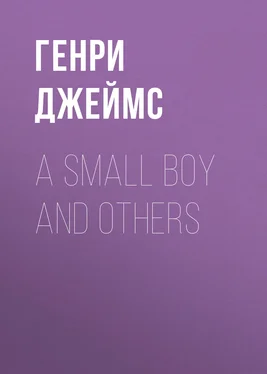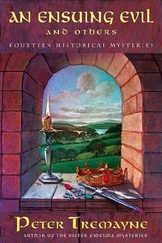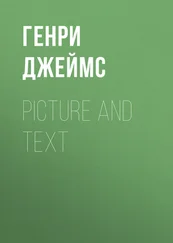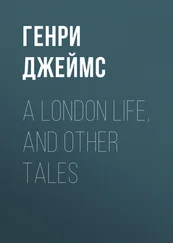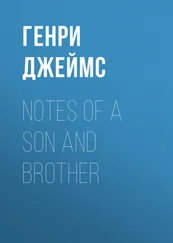Генри Джеймс - A Small Boy and Others
Здесь есть возможность читать онлайн «Генри Джеймс - A Small Boy and Others» — ознакомительный отрывок электронной книги совершенно бесплатно, а после прочтения отрывка купить полную версию. В некоторых случаях можно слушать аудио, скачать через торрент в формате fb2 и присутствует краткое содержание. Жанр: foreign_prose, foreign_antique, на английском языке. Описание произведения, (предисловие) а так же отзывы посетителей доступны на портале библиотеки ЛибКат.
- Название:A Small Boy and Others
- Автор:
- Жанр:
- Год:неизвестен
- ISBN:нет данных
- Рейтинг книги:5 / 5. Голосов: 1
-
Избранное:Добавить в избранное
- Отзывы:
-
Ваша оценка:
- 100
- 1
- 2
- 3
- 4
- 5
A Small Boy and Others: краткое содержание, описание и аннотация
Предлагаем к чтению аннотацию, описание, краткое содержание или предисловие (зависит от того, что написал сам автор книги «A Small Boy and Others»). Если вы не нашли необходимую информацию о книге — напишите в комментариях, мы постараемся отыскать её.
A Small Boy and Others — читать онлайн ознакомительный отрывок
Ниже представлен текст книги, разбитый по страницам. Система сохранения места последней прочитанной страницы, позволяет с удобством читать онлайн бесплатно книгу «A Small Boy and Others», без необходимости каждый раз заново искать на чём Вы остановились. Поставьте закладку, и сможете в любой момент перейти на страницу, на которой закончили чтение.
Интервал:
Закладка:
I was in my seventeenth year when the raid and the capture of John Brown, of Harper's Ferry fame, enjoyed its sharp reverberation among us, though we were then on the other side of the world; and I count this as the very first reminder that reached me of our living, on our side, in a political order: I had perfectly taken in from the pages of "Punch," which contributed in the highest degree to our education, that the peoples on the other side so lived. As there was no American "Punch," and to this time has been none, to give small boys the sense and the imagination of living with their public administrators, Daniel Webster and Charles Sumner had never become, for my fancy, members of a class, a class which numbered in England, by John Leech's showing, so many other members still than Lords Brougham, Palmerston and John Russell. The war of Secession, soon arriving, was to cause the field to bristle with features and the sense of the State, in our generation, infinitely to quicken; but that alarm came upon the country like a thief at night, and we might all have been living in a land in which there seemed at least nothing save a comparatively small amount of quite private property to steal. Even private property in other than the most modest amounts scarce figured for our particular selves; which doubtless came partly from the fact that amid all the Albany issue there was ease, with the habit of ease, thanks to our grandfather's fine old ability—he had decently provided for so large a generation; but our consciousness was positively disfurnished, as that of young Americans went, of the actualities of "business" in a world of business. As to that we all formed together quite a monstrous exception; business in a world of business was the thing we most agreed (differ as we might on minor issues) in knowing nothing about. We touched it and it touched us neither directly nor otherwise, and I think our fond detachment, not to say our helpless ignorance and on occasion (since I can speak for one fine instance) our settled density of understanding, made us an unexampled and probably, for the ironic "smart" gods of the American heaven, a lamentable case. Of course even the office and the "store" leave much of the provision for an approximately complete scheme of manners to be accounted for; still there must have been vast numbers of people about us for whom, under the usages, the assault on the imagination from without was much stronger and the filling-in of the general picture much richer. It was exactly by the lack of that filling-in that we—we more especially who lived at near view of my father's admirable example—had been thrown so upon the inward life. No one could ever have taken to it, even in the face of discouragement, more kindly and naturally than he; but the situation had at least that charm that, in default of so many kinds of the outward, people had their choice of as many kinds of the inward as they would, and might practise those kinds with whatever consistency, intensity and brilliancy. Of our father's perfect gift for practising his kind I shall have more to say; but I meanwhile glance yet again at those felicities of destitution which kept us, collectively, so genially interested in almost nothing but each other and which come over me now as one of the famous blessings in disguise.
There were "artists" in the prospect—didn't Mr. Tom Hicks and Mr. Paul Duggan and Mr. C. P. Cranch and Mr. Felix Darley, this last worthy of a wider reputation, capable perhaps even of a finer development, than he attained, more or less haunt our friendly fireside, and give us also the sense of others, landscapist Cropseys and Coles and Kensetts, and bust-producing Iveses and Powerses and Moziers, hovering in an outer circle? There were authors not less, some of them vague and female and in this case, as a rule, glossily ringletted and monumentally breastpinned, but mostly frequent and familiar, after the manner of George Curtis and Parke Godwin and George Ripley and Charles Dana and N. P. Willis and, for brighter lights or those that in our then comparative obscurity almost deceived the morn, Mr. Bryant, Washington Irving and E. A. Poe—the last-named of whom I cite not so much because he was personally present (the extremity of personal absence had just overtaken him) as by reason of that predominant lustre in him which our small opening minds themselves already recognised and which makes me wonder to-day at the legend of the native neglect of him. Was he not even at that time on all lips, had not my brother, promptly master of the subject, beckoned on my lagging mind with a recital of The Gold-Bug and The Pit and the Pendulum?—both of which, however, I was soon enough to read for myself, adding to them The Murders in the Rue Morgue. Were we not also forever mounting on little platforms at our infant schools to "speak" The Raven and Lenore and the verses in which we phrased the heroine as Annabellee?—falling thus into the trap the poet had so recklessly laid for us, as he had laid one for our interminable droning, not less, in the other pieces I have named. So far from misprizing our ill-starred magician we acclaimed him surely at every turn; he lay upon our tables and resounded in our mouths, while we communed to satiety, even for boyish appetites, over the thrill of his choicest pages. Don't I just recognise the ghost of a dim memory of a children's Christmas party at the house of Fourteenth Street neighbours—they come back to me as "the Beans": who and what and whence and whither the kindly Beans?—where I admired over the chimney piece the full-length portrait of a lady seated on the ground in a Turkish dress, with hair flowing loose from a cap which was not as the caps of ladies known to me, and I think with a tambourine, who was somehow identified to my enquiring mind as the wife of the painter of the piece, Mr. Osgood, and the so ministering friend of the unhappy Mr. Poe. There she throned in honour, like Queen Constance on the "huge firm earth"—all for that and her tambourine; and surely we could none of us have done more for the connection.
Washington Irving I "met," with infant promptitude, very much as I had met General Scott; only this time it was on a steamboat that I apprehended the great man; my father, under whose ever-patient protection I then was—during the summer afternoon's sail from New York to Fort Hamilton—having named him to me, for this long preservation, before they greeted and talked, and having a fact of still more moment to mention, with the greatest concern, afterwards: Mr. Irving had given him the news of the shipwreck of Margaret Fuller in those very waters (Fire Island at least was but just without our big Bay) during the great August storm that had within the day or two passed over us. The unfortunate lady was essentially of the Boston connection; but she must have been, and probably through Emerson, a friend of my parents—mustn't she have held "conversations," in the finest exotic Bostonese, in New York, Emerson himself lecturing there to admiration?—since the more I squeeze the sponge of memory the more its stored secretions flow, to remind me here again that, being with those elders late one evening at an exhibition of pictures, possibly that of the National Academy, then confined to scant quarters, I was shown a small full-length portrait of Miss Fuller, seated as now appears to me and wrapped in a long white shawl, the failure of which to do justice to its original my companions denounced with some emphasis. Was this work from the hand of Mr. Tom Hicks aforesaid, or was that artist concerned only with the life-sized, the enormous (as I took it to be) the full-length, the violently protruded accessories in which come back to me with my infant sense of the wonder and the beauty of them, as expressed above all in the image of a very long and lovely lady, the new bride of the artist, standing at a window before a row of plants or bulbs in tall coloured glasses. The light of the window playing over the figure and the "treatment" of its glass and of the flower-pots and the other furniture, passed, by my impression, for the sign of the master hand; and was it all brave and charming, or was it only very hard and stiff, quite ugly and helpless? I put these questions as to a vanished world and by way of pressing back into it only the more clingingly and tenderly—wholly regardless in other words of whether the answers to them at all matter. They matter doubtless but for fond evocation, and if one tries to evoke one must neglect none of the arts, one must do it with all the forms. Why I should so like to do it is another matter—and what "outside interest" I may suppose myself to create perhaps still another: I fatuously proceed at any rate, I make so far as I can the small warm dusky homogeneous New York world of the mid-century close about us.
Читать дальшеИнтервал:
Закладка:
Похожие книги на «A Small Boy and Others»
Представляем Вашему вниманию похожие книги на «A Small Boy and Others» списком для выбора. Мы отобрали схожую по названию и смыслу литературу в надежде предоставить читателям больше вариантов отыскать новые, интересные, ещё непрочитанные произведения.
Обсуждение, отзывы о книге «A Small Boy and Others» и просто собственные мнения читателей. Оставьте ваши комментарии, напишите, что Вы думаете о произведении, его смысле или главных героях. Укажите что конкретно понравилось, а что нет, и почему Вы так считаете.
